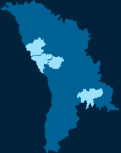Dutch practices for Moldovan youngsters
- Created on 04 March 2014
12 young people from 4 regions of the Republic of Moldova have learned from the Dutch experience how to promote the socio-economical rights of the youth. The secret was discovered in the frame of a work visit to The Netherlands, where several meetings with members of youth organizations took place. The experience exchange is a part of the "Decent Work for young people - Improving the social-economic situation of the young people in Moldova by empowering the youth and the civil society" project.
Liliana Lungu, coordinator of the Mobile Team from Falesti: „The whole team was profoundly impressed by the activities of the youth organizations and employment agencies from The Netherlands. These organizations offer a wide range of services, helping youngsters to get efficiently employed, and also making sure that the experience through which they go through to be a pleasant and useful one.”
Dutch youth organizations are the ones that help youngsters to adapt easier to the necessities of the job market, to know and to demand their rights as an employee, to work legally and to have a salary which fits their work activities. This practice could also solve the problems of the young generation from Moldova, when getting employed.
Daniela Dirzu, events coordinator of the "Decent Work for Youth" project: "We think it is necessary to join our efforts in order to develop more qualification and re-qualification sessions for graduates, as well as to contribute to their entrepreneurial education and also to the development of programs for internships. Therefore, the young people that are employed in a new work space would be prepared to integrate easier and have a shorter period of transition and adaptation."
Stela Stratila-Sirbu, president of the Youth Council of the National Confederation of the Syndicates from Moldova: "According to the Labor Code, the employers from the Republic of Moldova are obligated to sign individual contracts with each of the employees. The young people that are getting employed have to be more careful when signing a contract, and if they are not sure about some of the provisions, they can address to the Union Council. We are glad to assist anyone who comes to us with such a request, so they would avoid signing a contract that would be in their disadvantage as an employee."
The first steps in implementing the Dutch practices were already taken, by creating a network for promoting the social-economic rights of the youth (ROST). 27 organizations from 4 regions of the country are working for the elaboration of the work agenda for the next 3 years and for identifying the solutions for the employment of the young people. The socio-economical agenda of the youth will also contain specific recommendations for the national and local socio-economical actors.
Angela Ciocirlan, local coordinator of the "Decent Work for Youth" project: "The socio-economical agenda of the youth is now at the stage of consultations and development of the action plan. We know what we have to do. We learn from other institutions, we see the experiences of other countries and we can take them and adapt to our necessities. All is left for us to do is to join our efforts and to see what each of us can contribute with for solving the problems that the young people from Moldova are confronting with."
The agenda will be presented to the Ministry of Labor, Social Protection and Family. Ministry of Education, Ministry of Youth and Sport, Ministry of Economy, National Confederation of Syndicates from Moldova, National Confederation of the Employers of the Republic of Moldova, so there would be carried out that several joint actions for promoting the socio-economical rights of the youngsters and their employment .
***
The "Decent Work for young people - Improving the social-economic situation of the young people in Moldova by empowering the youth and the civil society" project is implemented by the ”Faclia” Public Association for Children and Youth in partnership with CNV International Foundation and the National Trade Union Confederation of Moldova. The project is financially supported by the European Union through the Instrument for Democracy and Human Rights. The general objective is to contribute to the empowering of the young people from the Republic of Moldova and of the Moldovan civil society, improving the social-economical situation of the youngsters from four regions of Moldova - Ungheni, Calarasi, Causeni and Falesti.




